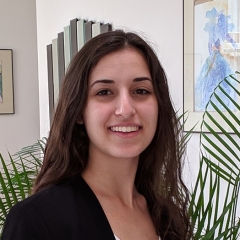Mathematical and Computational Finance (BA, BSc)
Virtual information sessions
Discover what makes Concordia's Faculty of Arts and Science stand out as a leader in the humanities and social and natural sciences, including academic opportunities, hands-on learning and how to achieve your goals.
Why study Mathematical and Computational Finance?
If you’re a problem solver, have great math skills and a keen interest in financial markets, you’ll thrive in Mathematical and Computational Finance, a field where these skills and interests intersect. Mathematical finance analysts apply their knowledge of mathematics, statistics, probability and financial theory to assess market forces and minimize risk and maximize profitability.
As a student, you’ll study mathematics, statistics, probability, economics and computer science along with finance and management at the John Molson School of Business. Specialized courses in Mathematical and Computational Finance will give you many opportunities to practise applying mathematics to finance.
You will also:
- Learn the computational and modelling techniques used to price tradable assets such as bonds, securities, loans, energy and associated derivatives
- Learn to create, model, price, hedge and trade innovative financial products
- Develop an analytical and strategic eye for managing the risk associated with complex financial transactions
This program is designed for students who wish to begin a career in quantitative finance after graduation, or those who plan to pursue graduate studies in financial engineering or mathematical finance.
Special funding for out-of-province students
Up to $4000 for undergraduate programs.
Program structure
A Bachelor of Arts or Science degree takes a minimum of three or four years (90 – 120 credits) of full-time study, depending on your academic background.
Program option
- Specialization in Mathematical and Computational Finance (90 credits)
Courses
Co-op program
The Co-op program gives you the chance to do paid work terms with financial institutions and other firms. As a Co-op student, you may work on:
- Risk analysis
- Model validation and vetting
- Derivatives analysis
Please note that you may apply for the Co-op option after completing your first academic term.
United States students: A U.S. Federal Student Aid-eligible version of this program is offered. This version meets all U.S. regulations (such as no co-operative education or e-courses) for eligible programs.
Admission criteria
Minimum cut-off averages and course requirements
- Quebec CEGEP: 28 overall, 30 math
- Natural Science DEC or
- DEC intégré en sciences, lettres et arts or
- Linear Algebra; Calculus 1 & 2; Mechanics, Electricity and Magnetism; Waves, Optics and Modern Physics; General Chemistry; Chemistry of Solutions and General Biology
- Additional information for CEGEP applicants
- High School: A overall, A math and science
- Canadian curricula course requirements
- Accepted international qualifications
- One math from Pre-Calculus, Calculus, or equivalent
- Two sciences (from Biology, Chemistry or Physics)
- ACT or SAT is not required
- AP exams are not required but may qualify you for advanced standing
- International Baccalaureate (IB) diploma: 35 overall, 5 HL or 6 SL math, 6 HL science
- one math (Applications and Interpretations HL, Analysis and Approaches HL or Analysis and Approaches SL)
- one science (Physics, Chemistry or Biology, either SL or HL)
- one of the math or science courses must be completed at the HL level
- International Baccalaureate Career-related Programme (CP): 35 overall, 5 HL or 6 SL math, 6 HL science
- Same as International Baccalaureate Diploma Programme (DP) requirements
- Additional Career-related Programme (CP) course requirements
- Baccalauréat français: 16 overall, 16 math and science
- Première: Spécialité mathématiques and Spécialité physique-chimie
- Terminale: Spécialité mathématiques (also accepted, Spécialité Physique-Chimie and Mathématiques Complémentaires)
- Additional information for Baccalauréat français applicants
- British system of education (GCE):
- A-levels: At least two A-level exams AA, A in math, A in science or
- AS-levels: At least 4 AS-level exams with equivalent results or
- BTEC: Level 3 Diploma or Extended Diploma in a related subject area with equivalent results
- Students without math or science A-levels may be admissible based on AS-level or iGCSE/GCSE/O-Level exam results. Students should include all their exam results from iGCSE (or equivalent) onwards to support their application.
- Additional information for British System of Education (GCE) applicants
- University Transfers (internal): 3.7 overall, 3.7 math and science
- University Transfers (external): A- overall, A- math and science
- Courses in the disciplines of Calculus, Linear Algebra, Biology, Chemistry and Physics
Minimum cut-off averages should be used as indicators. The cut-off data may change depending on the applicant pool. Applicants who meet the stated minimum requirements are not guaranteed admission to these programs.
Minimum cut-off averages and course requirements
- Quebec CEGEP: 28 overall, 30 math
- Linear Algebra; Calculus 1 & 2
- Additional information for CEGEP applicants
- High School: A overall, A math
- Canadian curricula course requirements
- Accepted international qualifications
- One math from Pre-Calculus, Calculus, or equivalent
- ACT or SAT is not required
- AP exams are not required but may you qualify for advanced standing
- International Baccalaureate (IB) diploma: 35 overall, 5 HL or 6 SL math
- one math (Applications and Interpretations HL, Analysis and Approaches HL or Analysis and Approaches SL)
- International Baccalaureate Career-related Programme (CP): 35 overall, 5 HL or 6 SL math
- Baccalauréat français: 16 overall, 16 math
- Première: Spécialité mathématiques
- Additional information for Baccalauréat français applicants
- British system of education (GCE):
- A-levels: At least two A-level exams AA, A in math or
- AS-levels: At least 4 AS-level exams with equivalent results or
- BTEC: Level 3 Diploma or Extended Diploma in a related subject area with equivalent results
- Students without a math A-level may be admissible based on AS-level or iGCSE/GCSE/O-Level exam results. Students should include all their exam results from iGCSE (or equivalent) onwards to support their application.
- Additional information for British System of Education (GCE) applicants
- University Transfers (internal): 3.7 overall, 3.7 math
- University Transfers (external): A- overall, A- math
- Courses in the disciplines of Calculus and Linear Algebra
Minimum cut-off averages should be used as indicators. The cut-off data may change depending on the applicant pool. Applicants who meet the stated minimum requirements are not guaranteed admission to these programs.
Application deadlines
It’s not too late to apply
Most undergraduate programs are still accepting applications for fall 2025.

FALL ENTRY (September)
Deadline: March 1
International applicants: Apply no later than February 1 to allow time for immigration document processing. However, applying earlier is strongly recommended. Immigration processing times vary by country, and delays could prevent you from starting your studies on time.

WINTER ENTRY (January)
Deadline: November 1
International applicants: Apply no later than August 1 to allow time for immigration document processing. However, applying earlier is strongly recommended. Immigration processing times vary by country, and delays could prevent you from starting your studies on time.
We reserve the right to close admission to a program at any time after the official deadline without prior notice.
After your degree
Mathematical and Computational Finance alumni may find employment in banks, investment firms, hedge funds, energy companies, government and other businesses. Graduates pursue careers in fields such as:
- Financial engineering
- Quantitative modelling and risk management
- Portfolio management
- Trading (equities, options, futures, interest rates, fixed income, currency, commodities, energy, credit)
- Algorithmic and high frequency trading
- Investment banking
Student story

Christina Aladas
Specialization in Mathematical and Computational Finance
From statistics to coding, Christina Aladas found the skills she learned complemented each other perfectly as she progressed in her program.
Other programs of interest

If you want to learn how to predict the future, consider actuarial mathematics. Actuaries use their mathematical and statistical wizardry to solve problems involving risk and uncertainty.
Department
Department of Mathematics & Statistics
Faculty

Model the future, solve problems involving risk, and make financial decisions that will affect the futures of corporations, communities and investors. This combined program offers you a direct path to an actuarial career with a financial sector specialization.
Department
Department of Mathematics & Statistics
Faculty

If you’re a problem solver, have great math skills and a keen interest in financial markets, Mathematical and Computational Finance is the field where these skills and interests intersect.
Department
Department of Mathematics & Statistics
Faculty


